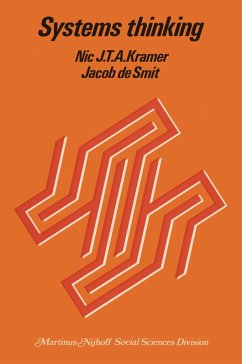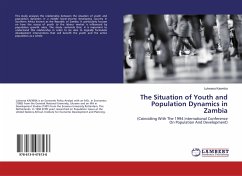Diploma Thesis from the year 2003 in the subject Business economics - Economic Policy, Vienna University of Technology (Wirtschaftswissenschaften), language: English, abstract: Inhaltsangabe:Abstract:
The diploma thesis Systems Thinking View on the Situation of Unemployment in the United States was performed at the University of California San Diego at the Department of Sociology with advise of Prof. John Evans PhD in cooperation with the Institute of Industrial Engineering, Ergonomics and Business Economics with advise of O.Univ.Prof. Dipl.-Ing. Dr.techn. Franz Wojda and Ass.Prof. Dipl.-Ing. Dr.techn. Walter Hackl-Gruber by Roland Schuster. It is in accordance to a specialization in leadership and organization.
The diploma thesis has its roots in the general system theory and emphasizes on a holistic view on the situation of unemployment in the United States. The chosen approach is a combination of state of the art scientific knowledge from the fields of sociology, psychology and economy. In the previous work performed for the thesis it was detected that the diversity of the basic approach is necessary in meeting the complexity of the issue. The many different factors influencing the chosen topic of unemployment are widespread.
Contributing to the theory of systems thinking the goal of the thesis was to find and describe an existing pattern that makes it possible to see the dynamic of the system. The systemic view takes in account that everything is interconnected and hence interacting. Systems thinking states that there are effects and influences on- and by unemployment that are only visible in applying a holistic view. The reason why the present paper is groundbreaking is not so much because of the used scientific knowledge, which is state of the art, but because of the combination of this knowledge. This combination is meant to regard to one of the tasks given by cybernetics in increasing differentiation instead of increasing growth.
The basic standpoint is that the quantity of existing knowledge is already enough to create possible approaches for ways to optimize the current situation. Only lacking is the understanding of how all the fragments are connected. Systems thinking, an application of system theory, in this context, is seen as a tool that makes it possible to develop a model to generate this understanding.
The thesis provides a brief overview of the United States Unemployment Insurance System and a systems thinking approach used for an interpretation of the current situation in the United States.
The diploma thesis is seen as basic work for further research on the situation of unemployment in the European Community.
Inhaltsverzeichnis:Table of Contents:
1.Abstract12
1.1Part I THEORY 12
1.2Part II REALIZATION AND RESULTS 12
1.3Endnotes Chapter 113
2.Part I THEORY 15
2.1The Philosophic Background or Why System theory? 16
2.1.1From Laplace s Daemon to System Theory16
2.1.2Endnotes Chapter 2.117
2.2Systems Thinking - an Overview22
2.2.1The development of Systems Thinking22
2.2.2Definition of Systems Thinking26
2.2.3The tools for Systems Thinking31
2.2.3.1Causal Loop Diagrams applied within the Thesis31
2.2.3.2Determining the Loop Polarity35
2.2.3.3Naming and Numbering of CLDs within the Thesis35
2.2.3.4The capability of CLDs36
2.2.3.5The Paper Computer (PC) applied within the Thesis36
2.2.3.6Description of the Paper Computer (PC)36
2.2.3.7Ascertainment of the Steering Possibilities39
2.2.3.8Design of the Intervention41
2.2.3.9Summary of the Practical Approach to Systems Thinking41
2.2.4Endnotes Chapter 2.242
2.3Introduction to Conflict Management49
2.3.1About Conflicts49
2.3.2About Consensus50
2.3.3Application of Conflict Management in the Thesis50
2.3.3.1Hypotheses Conce...
Hinweis: Dieser Artikel kann nur an eine deutsche Lieferadresse ausgeliefert werden.
The diploma thesis Systems Thinking View on the Situation of Unemployment in the United States was performed at the University of California San Diego at the Department of Sociology with advise of Prof. John Evans PhD in cooperation with the Institute of Industrial Engineering, Ergonomics and Business Economics with advise of O.Univ.Prof. Dipl.-Ing. Dr.techn. Franz Wojda and Ass.Prof. Dipl.-Ing. Dr.techn. Walter Hackl-Gruber by Roland Schuster. It is in accordance to a specialization in leadership and organization.
The diploma thesis has its roots in the general system theory and emphasizes on a holistic view on the situation of unemployment in the United States. The chosen approach is a combination of state of the art scientific knowledge from the fields of sociology, psychology and economy. In the previous work performed for the thesis it was detected that the diversity of the basic approach is necessary in meeting the complexity of the issue. The many different factors influencing the chosen topic of unemployment are widespread.
Contributing to the theory of systems thinking the goal of the thesis was to find and describe an existing pattern that makes it possible to see the dynamic of the system. The systemic view takes in account that everything is interconnected and hence interacting. Systems thinking states that there are effects and influences on- and by unemployment that are only visible in applying a holistic view. The reason why the present paper is groundbreaking is not so much because of the used scientific knowledge, which is state of the art, but because of the combination of this knowledge. This combination is meant to regard to one of the tasks given by cybernetics in increasing differentiation instead of increasing growth.
The basic standpoint is that the quantity of existing knowledge is already enough to create possible approaches for ways to optimize the current situation. Only lacking is the understanding of how all the fragments are connected. Systems thinking, an application of system theory, in this context, is seen as a tool that makes it possible to develop a model to generate this understanding.
The thesis provides a brief overview of the United States Unemployment Insurance System and a systems thinking approach used for an interpretation of the current situation in the United States.
The diploma thesis is seen as basic work for further research on the situation of unemployment in the European Community.
Inhaltsverzeichnis:Table of Contents:
1.Abstract12
1.1Part I THEORY 12
1.2Part II REALIZATION AND RESULTS 12
1.3Endnotes Chapter 113
2.Part I THEORY 15
2.1The Philosophic Background or Why System theory? 16
2.1.1From Laplace s Daemon to System Theory16
2.1.2Endnotes Chapter 2.117
2.2Systems Thinking - an Overview22
2.2.1The development of Systems Thinking22
2.2.2Definition of Systems Thinking26
2.2.3The tools for Systems Thinking31
2.2.3.1Causal Loop Diagrams applied within the Thesis31
2.2.3.2Determining the Loop Polarity35
2.2.3.3Naming and Numbering of CLDs within the Thesis35
2.2.3.4The capability of CLDs36
2.2.3.5The Paper Computer (PC) applied within the Thesis36
2.2.3.6Description of the Paper Computer (PC)36
2.2.3.7Ascertainment of the Steering Possibilities39
2.2.3.8Design of the Intervention41
2.2.3.9Summary of the Practical Approach to Systems Thinking41
2.2.4Endnotes Chapter 2.242
2.3Introduction to Conflict Management49
2.3.1About Conflicts49
2.3.2About Consensus50
2.3.3Application of Conflict Management in the Thesis50
2.3.3.1Hypotheses Conce...
Hinweis: Dieser Artikel kann nur an eine deutsche Lieferadresse ausgeliefert werden.








